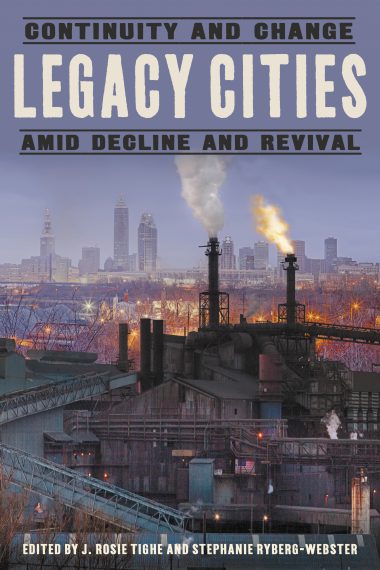Levin Professors Rosie Tighe and Stephanie Ryberg-Webster edit book on legacy cities.

Legacy Cities: Continuity and Change amid Decline and Revival
Rosie Tighe and Stephanie Ryberg-Webster, Editors
University of Pittsburgh Press, 2019
About the Book
Legacy cities, also commonly referred to as shrinking, or post-industrial cities, are places that have experienced sustained population loss and economic contraction. In the United States, legacy cities are those that are largely within the Rust Belt that thrived during the first half of the 20th century. In the second half of the century, these cities declined in economic power and population leaving a legacy of housing stock, warehouse districts, and infrastructure that is ripe for revitalization. This volume explores not only the commonalities across legacy cities in terms of industrial heritage and population decline, but also their differences. Legacy Cities poses the questions: What are the legacies of legacy cities? How do these legacies drive contemporary urban policy, planning and decision-making? And, what are the prospects for the future of these cities? Contributors primarily focus on Cleveland, Ohio, but all Rust Belt cities are discussed.
About the Authors
The book features several Maxine Goodman Levin School of Urban Affairs faculty, researchers, and alumni including Candi Clouse, Kirby Date, Ronnie Dunn, Tatyana Guzman, Megan Hatch, Dennis Keating, Wendy Kellogg, Kelly Kinahan, Norman Krumholz, Eunkyu Lee, Helen Liggett, Brian Mikelbank, Hunter Morrison, Merissa Piazza, Meghan Rubado, Stephanie Ryberg-Webster, Mark Salling, Aritree Samanta, Robert (Roby) Simons, Rosie Tighe, and Jinhee Yun.
Reviews
"The major contributions of Legacy Cities are that it illustrates change is in the wind, which is being powered by organized citizen action at the neighborhood level, that despite the inability of city governments to take extensive transformative efforts, the citizens are marshalling resources forces for positive change, and that, as with Ezekiel, there is still life in these old bones.”
–John Mullin, University of Massachusetts Amherst
"Legacy Cities fills a much needed gap in the literature on early twentieth century American cities, like Pittsburgh and Cleveland, as well as others in the Rust Belt. The contributors provide good discussions of several important considerations cities must confront including the role of citizen engagement in the planning process; the condition and quality of rental property at the lower end of the rent spectrum; dealing with the unfinished business of racial reconciliation; and, a very important chapter on local policing in a contemporary context.”
–Robert Silverman, University at Buffalo